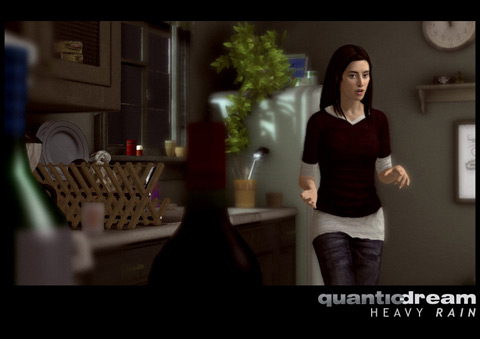This post has not been edited by the GamesBeat staff. Opinions by GamesBeat community writers do not necessarily reflect those of the staff.
Editor’s note: Ewan argues, with a little help from game developer Jenova Chen, that it’s not just games that need to evolve, but game reviewers. -Demian
Traditional video game reviews measure fairly limited criteria. How does the game look? How does it sound? Does the control system work? Many review outlets are so fixated on these standard qualities that they’ll dedicate specific paragraphs or sections to cover and evaluate each one.
But games are more than just an amalgam of graphics, sound, and controls; increasingly often, they are much more.
Jenova Chen from Thatgamecompany ruffled a few feathers during his session on the making of Flow and Flower at this year’s Develop conference — he argued that games should appeal to a wider range of emotions, and that game reviewers are missing the point.

The main thrust of Chen’s speech was that games need to develop mature content, but in a manner more sophisticated than simply jacking up the violence and sexual content. With both Flow and Flower, Chen’s desire was to create games that generate nuanced emotional responses from players.
Flow and Flower are both exceptionally unconventional games, and while they both received fairly high review scores, they were also criticized for delivering more style than substance.
One reviewer commented that Flow it was a “very pretty demo of what the SIXAXIS can do” (Hardcore Gamer Magazine).
A few years ago, Chen waded through a large group of game reviews and found the same phrases commonly repeated, such as ‘crystal sound’, stunning graphics’, ‘best FPS’ and ’60 hours gameplay.’
This is where he has determined that games reviewers are missing the point somewhat. His feelings are clear on the use of the traditional criteria: “That’s like talking about a car and how fast it goes — saying ‘it has great graphics’ is like saying ‘this car has four seats.’ Reviews should be talking about what a game makes players feel.”

Most modern big-budget games have not changed very much in terms of core content in the last 20 years. They follow the same general structure; the main goal is to progress forward either through the game’s story or through improving you character in order to beat stronger enemies.
Some games make this very obvious, such as the Monster Hunter series, and some dress up the standard progression with complex narrative, such as Mass Effect. But because games haven’t changed very much in this respect, the way we review them hasn’t changed either. The closest we will get to emotional comment on most games is on how rewarding the game is to complete.
This is not to say that developers have not tried to engage gamers on a more sophisticated manner. Quantic Dream and BioWare have both tried to add dimensions to their games by introducing emotional elements.
Quantic Dream went the whole nine yards with Fahrenheit (Indigo Prophecy in the U.S.), and tried very hard to put the gamer into the shoes of the game’s characters. Quantic’s new PS3 exclusive, Heavy Rain, looks to take this idea forward by creating a story that will persist even if one of the main characters dies.

BioWare engages the player through moral choices, which influence not only the way other characters respond to the player, but also affect the result of the story.
BioWare has reached a zenith with the Mass Effect trilogy, as players’ decisions in the first game will have lasting consequences that carry over to the second and third games. The resulting emotional attachment between player and game characters creates another knob for the developer to tweak — in the first game, for example, one of the player’s party members must die, and the player must choose which one.
Both developers have worked to achieve the more sophisticated gameplay experience that Chen is advocating. So it’s interesting to see how these games have been appraised by reviewers. Many gave no more than a cursory comment to the emotional engagement of these titles, concentrating instead on the virtues of each game’s technical achievements in graphics, sound and narrative.
Quotes from Metacritic for Mass Effect paint the picture perfectly:
“The cinematic design is nothing short of masterful. This is a game that takes the aspects of film that make cinema so compelling and crosses it with the interactivity of games with unprecedented success. Linear storytelling feels quaint by comparison.” (IGN)
“It’s surprising that so many small annoyances and glitches made their way into a game of such general high quality. Still, most players will be able to look past them and enjoy Mass Effect for what it is: A terrific role-playing game with great production values and fun, exciting action.” (Gamespot)“Mass Effect is still enjoyable enough to warrant 24 hours of play (completion with sub-missions), and the stops it makes en route are visually stunning. It just doesn’t find what it goes looking for: the myth and exotica to accurately follow Star Wars.” (Edge Magazine Christmas issue 2007)
“Where it doesn’t quite hit the mark for me is in the action stakes. Although it underpins the game with all sorts of excellent ideas that ought to make it a deeper, more intelligent and immersive experience, the simple truth is that the minute-to-minute combat simply isn’t as intense and involving as you’d expect from a game in 2007.” (Eurogamer)
These are some of the heavy weights of games journalism here. We have Edge, IGN, Gamespot and Eurogamer all relying on standard conventions to judge a game that was far from conventional. Some reviewers got the point though:
“A game of such rare emotion that we became attached to our characters to the point of missing them now it’s all over.” (X360 magazine UK Christmas issue 2007)
“It’s a rare thing when a game comes along with the power to move a player emotionally… Mass Effect takes interactive entertainment to breathtaking new heights.” (Gamespy)
Both of these reviews did also consider the technical merits of Mass Effect, but not without noting that the game offered more than an impressive interactive light show.
We will soon reach a point where we will have trouble building faster processors into smaller spaces, and when that day comes the leaps in graphical and sound quality will slow. Games developers are perfectly right to want to move in more creative directions to build games that will have much more emotional interaction.
Games like Mass Effect, Flow, Flower, and Fahrenheit are only the beginning. It is only fair that as game critics, we catch up. If we can explore the emotional content of games effectively, then we will do our part to help the industry mature in a more efficient and healthy manner.
We don’t need to stop asking how does it look, sound ,and play, these are still important questions. The question we should ask alongside these is how does it make us feel? Answer that one and no one is a loser.
